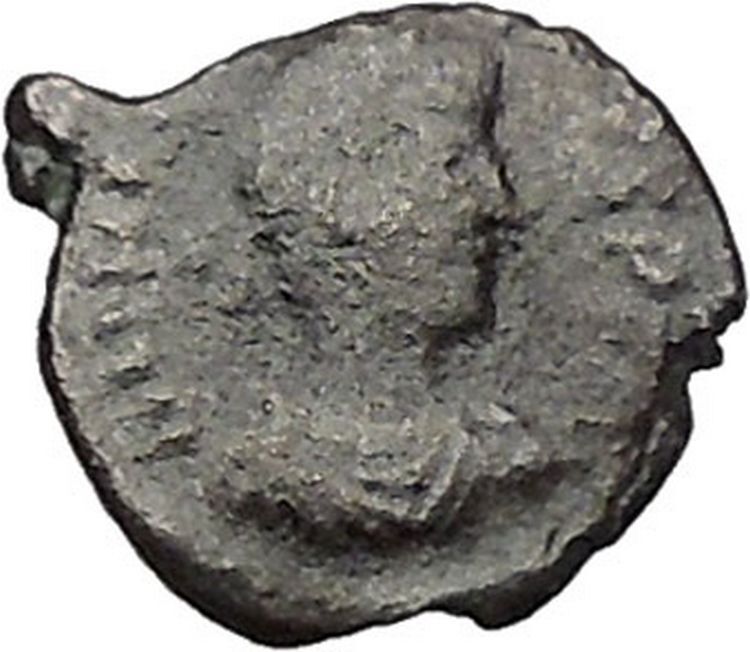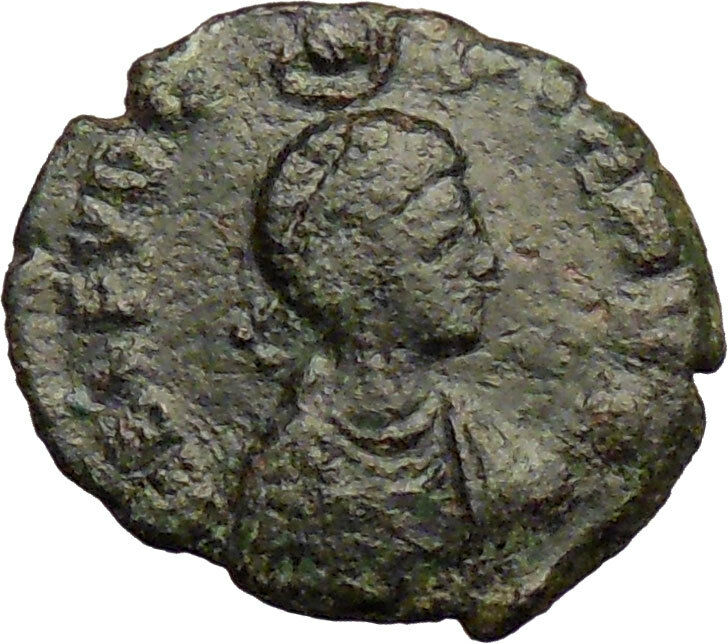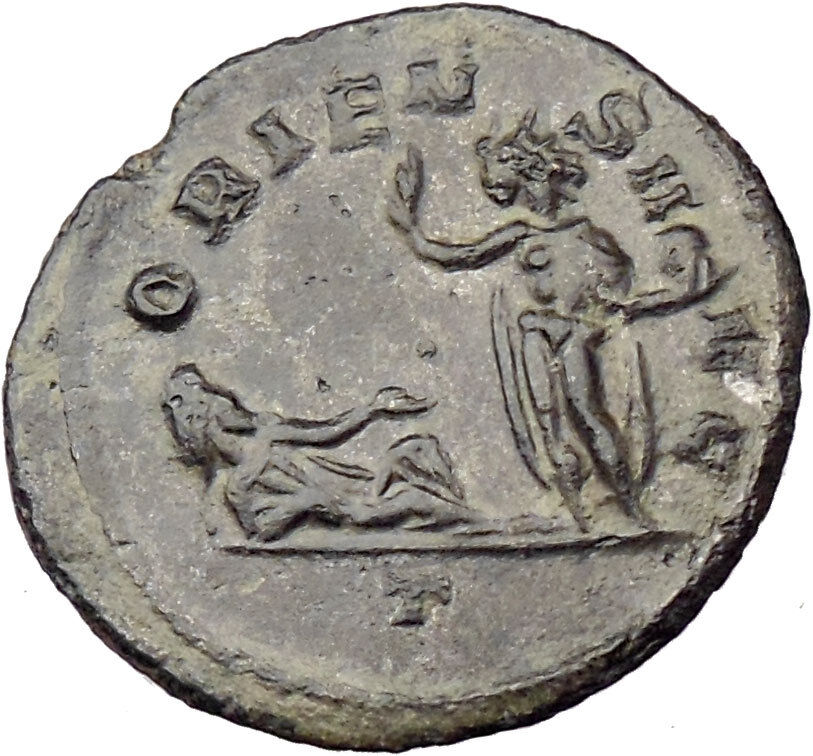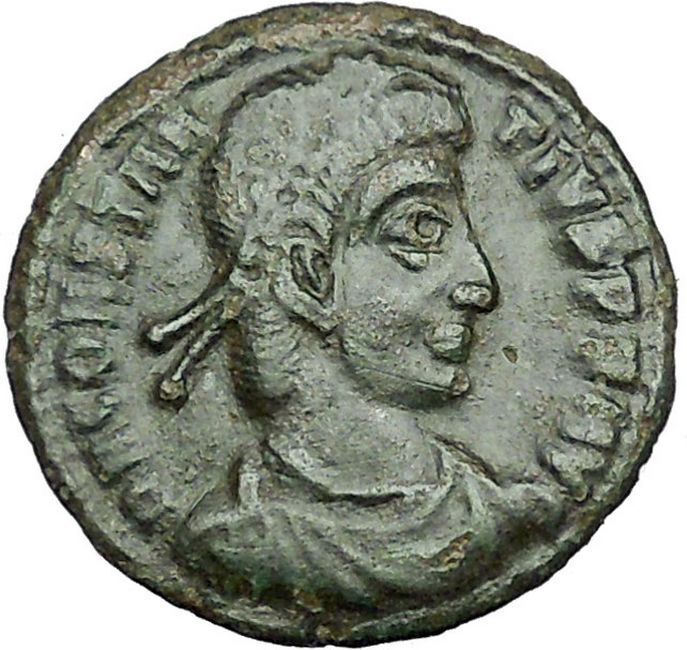|
Saloninus – Caesar: 258-259 and Roman Emperor: 260 A.D.
Billon Silver Antoninianus 21mm (4.21 grams) Antioch or Samosata mint, struck 258-260 A.D.
Reference: RIC V 36; Cohen 95; Sear 10775
SALON VALERIANVS NOB CAES, radiate, draped bust right.
SPES PVBLICA, Saloninus standing right, holding spear and receiving flower from Spes, standing left, raising hem of robe.
You are bidding on the exact item pictured, provided with a Certificate of Authenticity and Lifetime Guarantee of Authenticity.
In ancient Roman religion, Spes was the goddess of hope. Multiple temples to Spes are known, and inscriptions indicate that she received private devotion as well as state cult.
During the Republic, a temple to “ancient Hope” (Spes vetus) was supposed to have been located near the Praenestine Gate. It was associated with events that occurred in the 5th century BC, but its existence as anything except perhaps a private shrine has been doubted.
A well-documented temple of Spes was built by Aulus Atilius Calatinus along with Fides, as the result of vows (vota) made to these goddesses during the First Punic War.
At Capua in 110 BC, a temple was built to the triad of Spes, Fides, and Fortuna.
Imperial Hope
Spes was one of the divine personifications in the Imperial cult of the Virtues. Spes Augusta was Hope associated with the capacity of the emperor as Augustus to ensure blessed conditions.
Like Salus (“Salvation, Security”), Ops (“Abundance, Prosperity”), and Victoria (“Victory”), Spes was a power that had to come from the gods, in contrast to divine powers that resided within the individual such as Mens (“Intelligence”), Virtus (“Virtue”), and Fides (“Faith, Fidelity, Trustworthiness”).
Greek Elpis
The Greek counterpart of Spes was Elpis, who by contrast had no formal cult in Greece. The primary myth in which Elpis plays a role is the story of Pandora. The Greeks had ambivalent or even negative feelings about “hope”, and the concept was unimportant in the philosophical systems of the Stoicss and Epicureans.
Modern literature
In Rick Riordan’s The Heroes of Olympus series, the Day of Hope (also known as the Feast of Spes), which falls on August 1, is chosen by the series main antagonist, the primordial goddess, Gaia, as the day of her awakening. This is done with the irony that the day when humanity would place their hope to their highest would be the day when they would lose all their hope forever.
Publius Licinius Cornelius Saloninus (242 – 260) was Roman Emperor in 260.
Saloninus was born around the year 242. His father was the later emperor Gallienus, his mother Cornelia Salonina a Greek from Bithynia. In 258 Saloninus was appointed Caesar by his father (just like his older brother Valerian II, who had died around 258) and sent to Gaul, to make sure his father’s authority was respected there. (The title Caesar in Imperial nomenclature indicated that the holder was the Crown Prince and First-in-line-of Succession after Augustus, the title reserved to the ruling Emperor). Like Valerian II who was made the ward of Ingenuus,governor of the Illyrian provinces, Saloninus was put under the protection of Silvanus (praetorian prefect) (otherwise named as Albanus) As Caesar in Gaul Saloninus had his main seat in Cologne.
Bray conjectures that Saloninus’s appointment as Caesar, like that of his elder brother, Valerian II, in Illyria, was made at the instigation of Valerian who was, at once, the senior Emperor (Augustus) and grandfather of the two young Caesars and, as head of the Licinius clan, exercised also the potestas patriae over all members of the Imperial family, including his son Gallienus, his co-Emperor (and co-Augustus). Bray suggests that Valerian’s motive in making these appointments was the establishment of an Imperial dynasty, thus making the succession more secure. We do not know how Valerian envisaged his grandson interacting with the existing governors and military commanders of the Gallic provinces. There is no reason to suppose that he ever thought the thing through as systematically as Diocletian when he established the Tetrarchy some thirty years later. However, Silvanus must have been a seasoned soldier/administrator and he does seem to have harboured the notion that, as guardian of Valerian, he should exercise real authority in Gaul. This was demonstrated by the circumstances in which he fell out with the usurper Postumus.
In 260 (probably in July) Silvanus (no doubt in Saloninus’s name) ordered Postumus to hand over some booty that Postumus’s troops had seized from a German warband which had been on its way home from a successful raid into Gaul. However, Postumus’s men took violent exception to this attempt to enforce the rights of the representative of a distant Emperor who was manifestly failing in his duty to protect the Gallic provinces. Asserting what was probably the prevailing Custom of the Frontier they turned on Saloninus and Silvanus who had to then flee to Cologne with some loyal troops. It was probably at this time that Postumus was acclaimed Emperor by his army. Riding the tiger of military discontent which he could barely control, Postumus then besieged Saloninus and Silvanus in Cologne.
Gallienus, who was fully engaged elsewhere – probably campaigning on the middle Danube – could do nothing to save his son. (By this time Saloninus’s grandfather, the senior Emperor, Valerian was probably already a captive of the Persian King Shapur). Saloninus’s troops, in their desperation, finally proclaimed him Emperor, perhaps hoping that this would induce Postumus’s army to desert him and join them in a bid for Empire – i.e. against Valerian and Gallienus. If this was indeed their hope, they were to be disappointed in the event for Postumus’s army pressed on with the siege and, about one month later, the citizens of Cologne handed Valerian and his guardian over to their enemy. Postumus was then unable to prevent his army from murdering them. (Despite his public protestations of regret, it seems unlikely, in fact, that Postumus made a serious effort to this resist this course of events).
Whether or not Gallienus ever concurred with Valerian’s dynastic experiment is not known. Certainly the murder of Saloninus so soon after the suspicious death of Valerian II (q.v.)seems to have cured Gallienus of any ambition in this regard. (We may assume that Valerian’s mother, Salonina, would have been most unhappy: the death of her elder son, Valerian II, in Illyria under the tutelage of Ingenuus must have seemed to her to have confirmed her worst fears of this sort of arrangement). It had certainly proved to be folly to set up inexperienced boys as hostages to fortune and hope that their relationship to the Imperial family would quell provincial resentment at what was perceived as the inability of the central government to secure the frontiers from barbarian attack. Throughout the period of his sole reign Gallienus made no effort to elevate his third son, Egnatius Marinianus, to the purple or associate him in any way with his government of the Empire – although he did allow him to be elected to the largely ceremonial office of Consul in 268.
|










